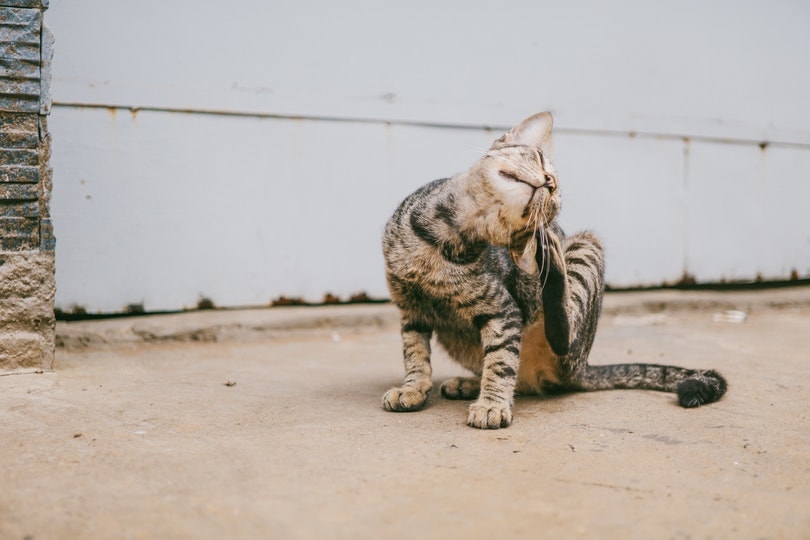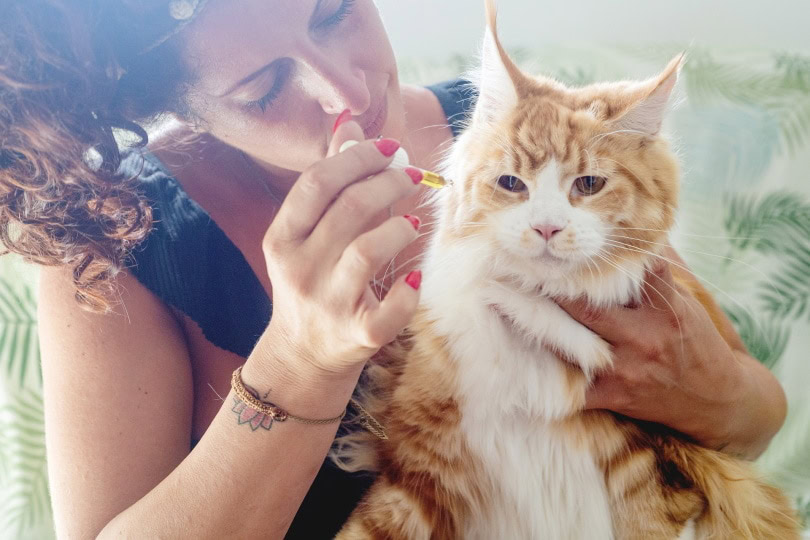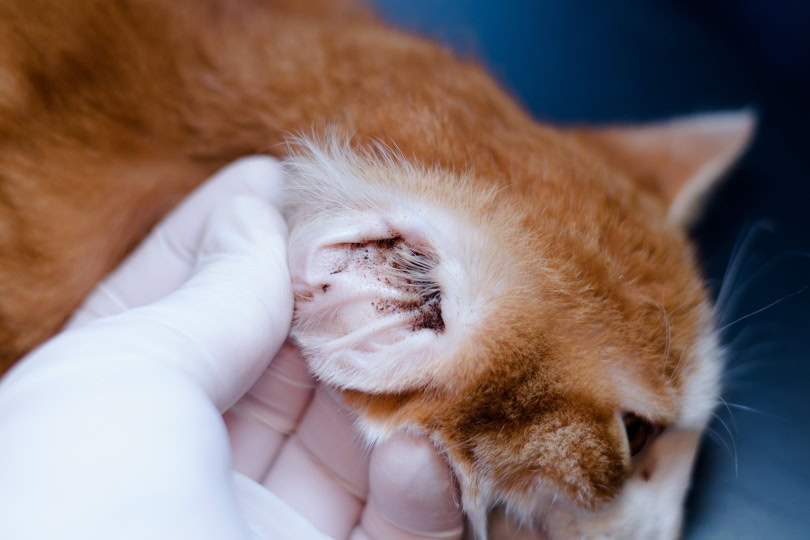VET APPROVED

The information is current and up-to-date in accordance with the latest veterinarian research.
Learn more »Click to Skip Ahead
Disclaimer: Home remedies are not an alternative to professional medical advice. If your pet has a serious issue, please consult your vet immediately.
Ear mites are irritating pests, and they can cause a lot of misery for your cat. So, whether you can’t afford the medication or don’t like the idea of putting chemicals in your cat’s ears, we have six home remedies that can help treat ear mites.
However, you should not treat ear mites without consulting your vet first. If not treated properly, ear mites can be dangerous and highly contagious to your other pets.

How Do You Know If It’s Ear Mites?
It’s important to determine if your cat has ear mites (Otodectes cynotis) before treating them. Signs of ear mites include:
- Frequent shaking of the head; your cat might tilt their head to the side for a while
- Excessive scratching around the ears and head
- Inflammation and redness in the ears
- Black or reddish-brown crusts around the outside of the ears
- Scratches and cuts around the outside of the ears, along with hair loss
- Coffee ground-like debris inside the ears
- Foul odor coming from the ears

If you notice these signs in your cat, you should visit your veterinarian.
How Does the Vet Treat Ear Mites?
A vet will diagnose ear mites by looking at a sample of their earwax under the microscope. From there, they may prescribe or recommend a parasiticide that can be given orally or topically in the ear or on other areas of the body.
Before treating, you’ll need to clean your cat’s ears well with a standard ear cleaner or a natural ear cleaner that is designed for pets. This is to remove as many of the ear mites and other debris as possible before treatment.
Ear mites are parasites that if left untreated, will not only cause significant discomfort for your cat but can also lead to bacterial infections and even partial or total hearing loss.
Before diving into the at-home treatments listed below, it is important to note that you should consult with a vet beforehand.

The 6 Natural Remedies for Treating Ear Mites
If you’re uncomfortable using a parasiticide on your cat, a few natural or home remedies can help eradicate the ear mites.
1. Apple Cider Vinegar
Apple cider vinegar is well known for its health benefits, including killing bacteria (the bad kind) and lowering cholesterol and blood pressure.
The vinegar must be diluted with water in a 1:1 solution. Put the mixture in a spray bottle, and shake well. You want the spray feature to be gentle because you don’t want the spray to hit anything but inside their ears (especially since this area is close to the eyes).
Spray gently inside your cat’s ears once or twice daily for up to 10 days. Also, remember that vinegar is acidic and shouldn’t be used if your cat’s scratching has caused any open sores.
- Reduces itchiness
- Known to be effective in cleaning and disinfecting
- Eradicates pathogens, which include bacteria
- High acidity will kill the mites and eggs
- Can’t be used near open sores or it will burn
- Might irritate your cat’s eyes
- Some cats might have an allergic reaction to ACV
2. Oil

Coconut and olive oil can be used to eliminate ear mites. Coconut oil is famous for many of its health benefits. It’s known for lowering the risk of heart disease, aiding in weight loss, and killing viruses, bacteria, and fungi. Olive oil helps reduce inflammation and has strong antibacterial properties.
You start by gently warming the oil until it’s just slightly warm to the touch. You do not want to put hot oil into your cat’s ears! Gently massage a few drops of the oil into your cat’s ears several times a day for up to 10 days.
- Good for skin and hair health
- Strong antibacterial properties
- Anti-inflammatory properties
- Expensive
- Messy
3. Vaseline
Vaseline, also known as petroleum jelly, is effective in healing minor burns and cuts and has antibacterial, anti-inflammatory, and antifungal properties.
Rub Vaseline into your cat’s ears once or twice every day until the ear mites are gone. It will ease any itchiness and swelling, and it can help heal abrasions.
While petroleum jelly can heal minor cuts, if they aren’t cleaned out well, you’ll end up trapping dirt and bacteria in the wound, which can lead to infection.
- Can heal minor burns and cuts
- Anti-inflammatory, antibacterial, and antifungal properties
- Will ease itchiness and swelling
- Ensure that your cat can’t ingest any
- Try not to use it on any uncleaned cuts, or you might trap dirt and bacteria
4. Aloe Vera

Aloe vera is good at healing minor burns. A study conducted on patients with scabies found that aloe vera was just as effective at eradicating them as benzyl benzoate.
Aloe vera can get rid of ear mites and will effectively ease some of the pain and inflammation in your cat’s ears. Rub aloe vera in your cat’s ears until the ear mite problem clears up.
- Healing properties on burns and cuts
- Relieves pain and swelling
- Aloe vera plant is toxic when ingested, so be sure you’re using it safely
5. Yellow Dock Root
Yellow dock is an herb commonly used in salads, and the oil from its roots is used in natural remedies. It is effective against inflammation and bacterial infections and contains chemicals that can help eradicate fungus, bacteria, and parasites.
Dilute 10 drops of yellow dock root oil in 1 tablespoon of water. Dab a cotton ball in this solution, and gently press it into your cat’s recently cleaned ears to distribute the solution. Do this once every day until the ear mites are gone.
- Anti-inflammatory
- Is antibacterial and antifungal
- Contains chemicals that help eradicate parasites
- Your cat might experience skin irritation
6. Organic Honey

Organic or raw honey is honey that has not been put through pasteurization. While pasteurization helps preserve honey for a longer shelf life, it also destroys many of its health benefits. If you use honey for your cat’s ear mites, you need to ensure it is raw or organic and has not been pasteurized.
Raw honey has antioxidants, can heal wounds, and has antibacterial and antifungal properties. It contains a natural form of hydrogen peroxide and can act as an antiseptic.
Rub a cotton ball with a small amount of honey in your cat’s ears. Let the honey sit in the ears for about 20 to 30 minutes, and then gently wipe it away with warm water. If your cat will let you, repeat this process two times a day until the mites are eradicated.
- Heals wounds and contains antioxidants
- Is antibacterial and antifungal
- Safe for cats to ingest
- Contains natural hydrogen peroxide and is an antiseptic
- The sticky mess that needs to be applied and then wiped off
- You can only use raw or organic honey
- Gentle Care For All Pets - Infused with moisturizing hypoallergenic ingredients & enriched with...
- Deep Cleans From Head to Tail - Tackle the toughest dirt & messes with our extra strong pet wipes...
- Freshness On The Go - Each dog grooming wipes pack contains 30 counts of premium dog wipes that...
Whether your pet needs a quick refresh or cleanup of a sensitive area, pet-safe wet wipes are a convenient option. We recommend Hepper's Wash Wipes because they're effective on dirt and odors but also gentle on the skin. These USA-made premium wipes are safe for cats and dogs of any age and contain hypoallergenic, moisturizing ingredients.
At PangoVet, we've admired Hepper for many years, and decided to take a controlling ownership interest so that we could benefit from the outstanding designs of this cool cat company!

Conclusion
Please speak to your vet before you attempt any of these remedies! You need a proper diagnosis before you should begin any at-home treatments. Your cat might be sensitive to some of these ingredients, and you don’t want them to have an adverse reaction. Not properly treating the ear mites might result in your cat being in pain and losing some or all of their hearing.
Remember to thoroughly clean your cat’s ears with an ear cleaner meant for cats before you start any treatment. You don’t want to trap any dirt or bacteria underneath the ingredient, which will only cause further ear irritation.
See Also:
- Notoedric Mange in Cats: Signs, Causes & Care (Vet Answer)
- My Cat Is Scratching Their Ears Raw! What’s Wrong? Our Vet Answers
Featured Image Credit: Todorean-Gabriel, Shutterstock













